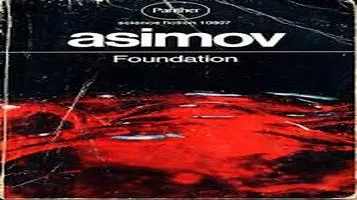A Grand Sci-Fi Epic: Isaac Asimov's "Foundation"
"Foundation" is a science fiction novel written by Isaac Asimov, first published in 1951. It is the first book in the Foundation series, which explores the rise and fall of a galactic empire. The story is set in a future where humanity has colonized the galaxy, and it follows Hari Seldon, a psychohistorian who develops a scientific method to predict the future on a large scale. Seldon foresees the impending collapse of the Galactic Empire and establishes the Foundation, a group of scientists and engineers tasked with preserving knowledge and minimizing the period of chaos. The novel delves into themes of determinism, the power of knowledge, and the cyclical nature of history, making it a cornerstone of science fiction literature.

Isaac Asimov’s "Foundation" is a seminal work in the science fiction genre that has captivated readers since its publication in 1951. The first book in what eventually became a sprawling series, "Foundation" is a masterclass in world-building, intellectual intrigue, and speculative storytelling. Through its intricate narrative and ambitious scope, it explores the rise and fall of civilizations, the power of knowledge, and the inevitability of change.
Plot and Structure
"Foundation" is set in a future where humanity has spread across the galaxy and established a vast Galactic Empire. However, this empire is in decline, and the story begins with the mathematician Hari Seldon who has developed a scientific discipline known as psychohistory. This theoretical framework combines history, sociology, and mathematics to predict the future of large populations. Seldon foresees the collapse of the empire and a subsequent dark age that will last 30,000 years. To mitigate this, he devises a plan to create a "Foundation" at the edge of the galaxy, designed to preserve and expand human knowledge, thereby shortening the dark age to a mere thousand years.
The novel is structured as a series of interlinked short stories, each focusing on different crises faced by the Foundation over a span of several decades. This episodic format allows Asimov to explore a variety of political, economic, and social themes, while also demonstrating the evolving nature of the Foundation and its mission.
Themes and Ideas
One of the central themes of "Foundation" is the cyclical nature of history. Asimov draws heavily on historical parallels, most notably the decline of the Roman Empire, to craft a narrative that feels both timeless and relevant. The concept of psychohistory itself is a fascinating exploration of determinism versus free will. Seldon’s predictions are based on the idea that while individual actions are unpredictable, the behavior of large groups can be statistically forecasted. This raises intriguing questions about the role of individuals in shaping history and the extent to which our destinies are preordained.
Another prominent theme is the power and importance of knowledge. The Foundation is established as a repository of human wisdom, and its success is largely due to its ability to harness and apply this knowledge. Asimov’s portrayal of science and reason as forces for progress is both a celebration of human ingenuity and a cautionary tale about the dangers of complacency and dogma.
Characters and Development
While "Foundation" is not a character-driven novel in the traditional sense, it features a cast of compelling figures whose actions and decisions drive the plot. Hari Seldon is the intellectual architect of the Foundation, a visionary whose influence persists long after his death through the “Seldon Crises” – pre-recorded messages that guide the Foundation through pivotal moments.
Other notable characters include Salvor Hardin, the pragmatic and cunning mayor of Terminus (the planet where the Foundation is based), and Hober Mallow, a shrewd trader whose actions help to secure the Foundation’s economic dominance. These characters, while not deeply fleshed out in terms of personal backstory, are memorable for their roles in the larger narrative and their embodiment of the novel’s themes.
Writing Style and Pacing
Asimov’s writing style is clear and precise, with a focus on dialogue and ideas rather than elaborate descriptions or emotional depth. This can make "Foundation" feel somewhat dry to readers accustomed to more character-driven or visually rich narratives. However, for those who appreciate intellectual rigor and conceptual complexity, Asimov’s prose is a perfect fit.
The pacing of "Foundation" is brisk, with each story presenting a new challenge or turning point for the Foundation. This episodic structure keeps the reader engaged, although it can sometimes feel disjointed as the narrative jumps across time and space. Nevertheless, Asimov’s skillful plotting ensures that each story builds upon the previous ones, creating a cohesive and compelling arc.
Impact and Legacy
"Foundation" has had a profound impact on the science fiction genre and beyond. Its influence can be seen in the works of numerous authors, filmmakers, and thinkers. The novel’s exploration of the interplay between science, society, and history has resonated with readers for decades, and its themes remain relevant in today’s world.
In recent years, "Foundation" has been adapted into a television series, bringing Asimov’s vision to a new generation of audiences. While adaptations often struggle to capture the full depth and nuance of their source material, this renewed interest in "Foundation" is a testament to its enduring appeal and significance.
Conclusion
Isaac Asimov’s "Foundation" is a towering achievement in science fiction literature. Its ambitious scope, thought-provoking themes, and innovative narrative structure make it a must-read for fans of the genre. Though it may not appeal to everyone’s tastes, especially those seeking emotional depth or traditional character arcs, its intellectual richness and visionary storytelling mark it as a timeless classic. For anyone interested in the future of humanity, the nature of history, and the power of knowledge, "Foundation" offers a compelling and rewarding journey.






